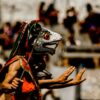Culture is a reflection of a society’s beliefs, traditions, and way of life, shaping how people connect with each other and their environment. It encompasses the customs, language, art, rituals, food, clothing, and shared values that define a group or nation. Here are key aspects of culture:
Traditions and Customs
Every culture has its own set of traditions and customs that are passed down through generations. These may include specific ways of celebrating festivals, conducting ceremonies, or observing rites of passage like marriage, childbirth, or death. Customs also dictate social behavior, such as greetings, etiquette, and respect for elders.
Language
Language is a crucial part of culture. It serves as a primary means of communication and also as a carrier of heritage and identity. Many cultural nuances, idioms, and expressions are tied to the language spoken in a particular region or community.
Art and Music
Art and music are key expressions of culture. Traditional art forms, whether in painting, sculpture, dance, or theater, reflect the values and stories of a culture. Music, both traditional and modern, often tells the history of a people or expresses their emotional and social experiences.
Religion and Spirituality
Religion often plays a significant role in shaping cultural practices and beliefs. It can influence festivals, moral codes, dietary practices, and rituals. For many cultures, spiritual beliefs and the connection to the divine are central to everyday life.
Food and Cuisine
The food people eat is deeply connected to their culture. Cuisine is influenced by the region’s geography, climate, and available resources. Traditional dishes often carry significant cultural meaning and are an important part of celebrations, religious events, and daily life.
Clothing
Clothing is another significant aspect of culture. Traditional attire reflects a community’s history, social norms, and sometimes its religious beliefs. Different regions have unique styles of clothing, often worn during festivals or important events to signify cultural pride.
Social Structure
Culture also includes the social structure, which dictates how people interact and organize themselves. This can be influenced by factors such as family values, gender roles, and social hierarchies. Social norms, such as respect for authority, importance of family, and communal living, vary from culture to culture.
Festivals and Celebrations
Festivals are a vibrant expression of culture, often tied to religious beliefs, seasonal changes, or historical events. They offer communities a chance to come together, celebrate, and pass on traditions to future generations.
Cultural Identity
For individuals and communities, culture is a source of identity and belonging. It provides a sense of continuity and connection to the past while also adapting to modern influences. Cultural pride is often tied to national or ethnic identity, and preserving cultural heritage is important for maintaining a group’s uniqueness.
In summary, culture is the fabric of human life, encompassing everything from the way people dress and eat to how they celebrate and interact with each other. It shapes communities and provides individuals with a sense of belonging and identity, influencing everything from daily routines to major life events.








